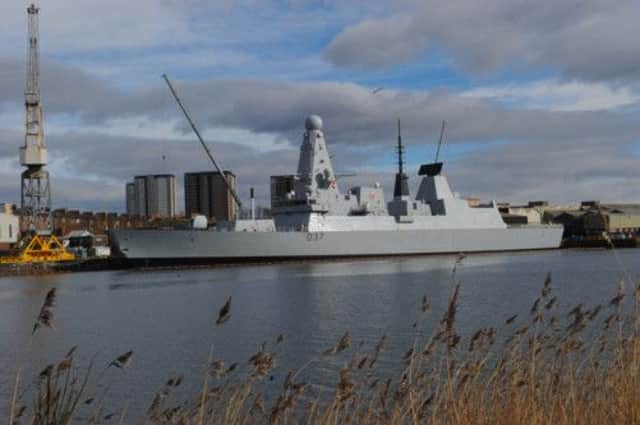Scottish independence: MoD defence deal warning


Ahead of a Scotsman conference today on the future of the country’s vital defence industry in the event of independence, Dr Phillips O’Brien, of Glasgow University, said Holyrood would have to negotiate a reciprocal deal with London in the hope of keeping Ministry of Defence (MoD) contracts in Scotland.
Hardly any European Union country now builds military vessels outside their own borders, Dr O’Brien said. Asked if Britain would continue to order its naval warships from the two Clyde yards, he said: “Only if the Scottish navy bought all of its electronics from the UK. They [the UK] are not going to give any more money [to Scotland] than they receive back.”
Advertisement
Hide AdAdvertisement
Hide AdUnion leaders last night said that such a deal was “theoretically” possible, but they said that both the SNP and coalition governments should now give more clarity to voters, especially the 4,500 shipyard workers based in Scotland. There was also uncertainty facing the 6,500 staff employed at the Clyde Naval base in Faslane, they added.
The fears over the shipyard jobs were dismissed by Deputy First Minister Nicola Sturgeon yesterday, however, who told MSPs that it was not “credible” to argue that the country’s yards will not succeed in the future “regardless of the constitutional arrangements”.
Shadow defence secretary Jim Murphy will say at today’s event at the National Galleries of Scotland that a Yes vote next year will sever the link between MoD jobs and Scotland.
The conference comes as the UK government today reiterates its view that, after independence, Scottish suppliers “may not be eligible” to bid for MoD contracts for items such as warships, tanks, aircraft and artillery.
Dr O’Brien – who is director for the Scottish Centre for War Studies – said the question of whether the Scottish yards could keep hold of UK work was unclear.
He said: “It would be a question of efficiency. The problem is that hardly anyone does go outside their own country. The Dutch build their own ships, the Danes build their own ships. The Norwegians buy from the Spanish, but only because they [the Spanish] are undercutting everyone else.”
He said that an independent Scottish Government could help subsidise the industry by diverting a major portion of its defence budget to ship building. However, he said this would mean removing funds from other parts of the defence budget at the cost of jobs.
Ian Waddell, national officer for Unite’s Aerospace and Shipbuilding division, said last night: “It is true that workers in the Clyde shipyards are extremely worried about what might happen if independence goes ahead and what the consequences might be.
Advertisement
Hide AdAdvertisement
Hide Ad“Theoretically, there might be some sort of arrangement that could be struck between the two governments, but who knows? It is a bit of a conundrum and I think there is a responsibility on both the SNP and Westminster to give some clarity to people.”
Ms Sturgeon, however, told the Scottish Parliament that the yards would thrive no matter next year’s vote. “I know that the skill and efficiency of its workforce will equip that shipyard to compete, and compete successfully, regardless of the constitutional arrangements. Anybody who suggests that our shipyards would not succeed in the future is not being entirely credible.”
SNP defence spokesman Angus Robertson is likely to argue at today’s conference that with the UK preparing to commission further vessels, and with an independent Scotland also requiring its own vessels, there is “huge potential for Scottish shipyard requirement which is a tremendous opportunity for Scotland”.
Ms Sturgeon pointed to the fact that the MoD had recently ordered a ship from South Korea as evidence that it bought boats from foreign countries.
However, Dr O’Brien said the order had been placed because the ship was a tanker, and could not be built at British yards.
Mr Murphy will tell today’s conference: “If we wave cheerio to the UK we can kiss goodbye to the thousands of UK defence jobs in Scotland.
“If we leave the UK we leave the Royal Navy and would join the long queue of foreign countries bidding for Royal Navy work. The Royal Navy doesn’t build complex warships in foreign yards so workforces in the Clyde and Rosyth will be at risk from SNP plans.
“Scotland’s future can be building the best warships in the world for the Royal Navy, not being locked out of that work as a foreign country. Defence jobs are vital to the Scottish economy and yet independence puts thousands at risk.”
Advertisement
Hide AdAdvertisement
Hide AdToday’s conference coincides with the UK government’s response to a Scottish affairs committee report on the impact of independence on Scotland’s defence industry.
The government said it remained committed to procuring warships, tanks and other military equipment from within the UK, adding that, as a consequence “Scottish suppliers may not be eligible to bid for such contracts if Scotland was to become independent”.
Iain Davidson MP, the chair of the committee, said: “Scotland benefits from being able to sell products to the MoD and from being able to share the defence exports from the UK to its allies, particularly the US. This would not be the case if Scotland were a foreign country.”